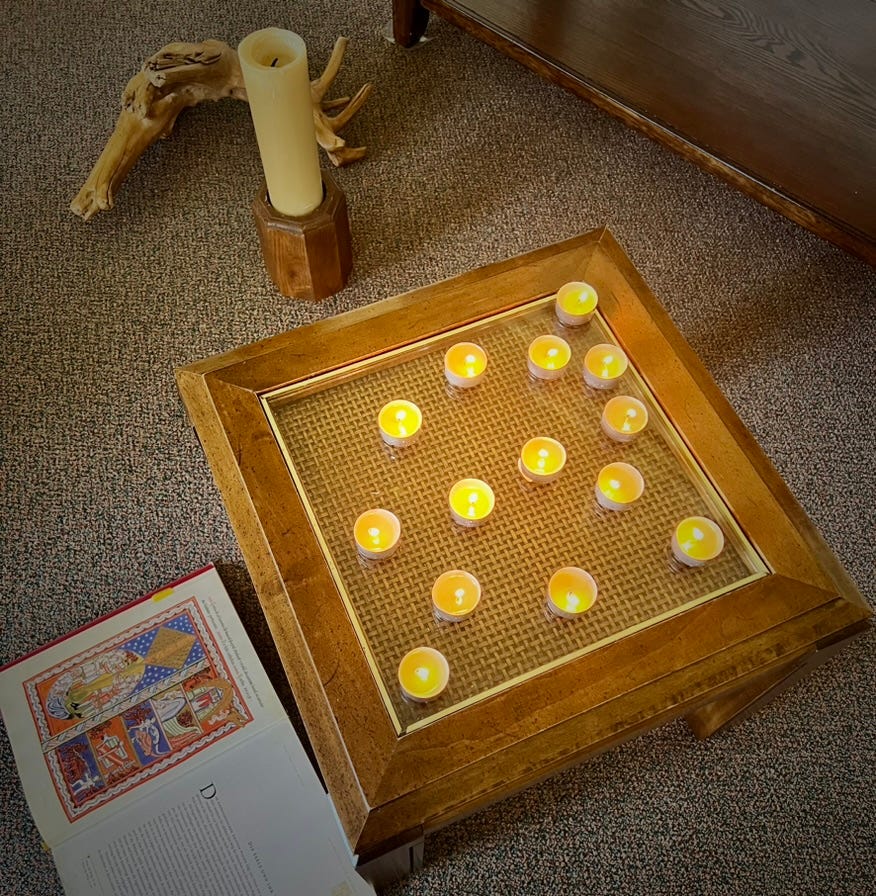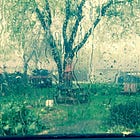"Do you want to be made well?" Stirred waters and memorial yards
Weaving Gospel, garden, and memory—a return to forgotten memorials, innocent wisdom, healing waters, and overgrown places that ask for tender care.
Dear fellow pilgrim,
Today is the Seventh Sunday of Easter—the final Sunday in this long season of resurrection, before Pentecost comes to stir the winds and light the fire.
Did you know that Easter is not just a day, but a season—fifty days long?
I think that makes sense. New life, like spring, unfolds slowly.
It rarely comes in one dramatic moment, but in small steps, back steps included.
Colder days mingle with warmth, rain with sunrises, tears with joy.
Our lilac just started to bloom, scenting the tender morning air with its sweetness.
Over the past weeks of our garden series, we’ve wandered together through the spirituality of gardening — as monastic practice, as “sacred rebellion,”
as tending to our inner person, as Meister Eckhart reminds us, and as a rejuvenation of Viriditas, that green force of divine life Hildegard of Bingen loved to name and praise.
This week, we’re still walking in the garden—
both the one outside, and the one we carry within.
After I shared Hannah’s Memorial Day blessing—“It is sad that people do not resurrect immediately”—
many of you wrote back with your own memories, griefs, and gratitudes.
I realized there was more to say. More to remember.
Today, I want to take you into our memorial yard—
a small, overgrown space in the back of our garden—
led by the quiet wisdom of my six-year-old daughter,
who has been drawing me into her childlike perspective,
what theologian Paul Tillich once called dreaming innocence.Aren’t we all in need of that dreaming innocence—at least from time to time?
Her tender questions this Easter season opened my heart
and brought me back to a place of quiet memory—to tend it again.
It is, perhaps, one of the most sacred functions of gardens and gardening:
to hold what has been lost, and to make room for what may yet grow.
But before we enter the memorial yard, let me start with stirring the waters.
“Do you want to be made well?”
Isn’t that an odd question—Jesus asking the desperate man at the Pool of Bethesda?
At least, that’s how the Gospel reading for the Seventh Sunday of Easter goes (John 5:1–9).
Apparently, this man had been waiting for decades beside the pool—
a pool where the waters were stirred from time to time,
and tradition held that the first to step in at just the right moment might be healed.
But this man—paralyzed for thirty-eight years—had no one to help him into the water.
Every time, someone else was faster.
And so he got stuck.
Close to the waters, but still waiting.
Waiting for outside help, for the right time, for something that never arrived.
And when Jesus finally speaks to him, the man doesn’t really answer the question.
He diffuses it.
He points to others.
To the world around him.
To the lack of help.
But that was not Jesus’ question.
He asked:
“Do you want to be made well?”
It’s a question that reaches beyond the body.
Beyond our expectations.
Even beyond our resistance.
It’s one of those questions that turns everything upside down.
A story we often interpret externally becomes, suddenly, an invitation to go inward.
It’s a question meant to meet us in our stuck places—
in the gardens we’ve abandoned,
in the stories we’ve stopped telling,
in the wounds we’ve left unnamed.
The man had waited thirty-eight years in his brokenness,
hoping someone would help him, stir the water for him,
carry him into the healing.
But Jesus upends that waiting.
He asks the one question that needed to be asked:
Do you want to be made well?
Do you want to?
And then—he invites the man to get up,
to take his mat,
and to walk into the healing waters himself.
Do you want to be made well, dear friend?
Do I?
Here is the story of me walking into the stirred waters—
a place I, too, had sat beside before,
until the dreaming innocence of my child let me in.
And so, stirred by that Gospel story,
here is where I found myself last week—
not at the pool of Bethesda,
but in a small, forgotten garden behind our house.
🌱 The Garden of the Little Ones
A second stanza of resurrection
There’s a corner in our yard that had begun to quietly overgrow.
We brought the soil and stones from our old home.
Buried them with care.
The earth held the memory of those early losses—
not children, exactly, but tender beginnings.
Little lives that stirred and faded
before they could be held,
before they could be named.
Tiny beans, really—too small to bury,
too real to forget.
We planted a stone.
We rang a bell.
We wept, silently.
But grief, left unspoken, tends to grow over.
Weeds of forgetting. Leaves of fear.
Until Hannah found it again.
She had been asking about death.
Wondering if she, too, could die.
And somehow—I don’t know how—I found the words.
I told her about those early stirrings of life.
The small ones that never stayed.
The ones that lived in me for a moment
and then slipped away.
The ones who never made it to the table,
but remained part of our story.
And something in her lit up.
She cried, yes. But more than that—she rejoiced.
She had always known she was not alone.
Now she had a name for it:
“the ones who came before me.”
That comforted both our hearts.
So often we avoid the pain.
But walking into that pain—stirring the waters around it—
brought a surprising calm.
It took some of the sting from death.
I still carry a mother’s fear.
But now, when I fear for my living child,
there’s a quiet comfort in imagining
that those early beginnings—
not full selves, but perhaps something like presence—
might be waiting for her.
Not as siblings in the usual sense,
but as welcome.
As memory.
As a soft unfolding of the love that stirred them into being.
So we went out into the garden that day.
She helped me resurrect it—
the very one she had helped transplant as a toddler.
We found the buried stones.
We weeded the earth.
We rang the bell again.
And for the first time, I saw what I hadn’t dared to see:
That even these faint beginnings were part of her story, too.
Part of our family’s unfolding mystery.
Waiting, perhaps, just beyond the veil.
Blessing her even now.
A Blessing
For the gardens we forgot to tend.
For the grief we buried too deep to name.For tender beginnings lost along the way—
May they find their place again at your table.
May their memory rise, like spring,
and offer peace where fear once rooted.And may those who live
feel the joy of being part of a great
and unseen
communion.
Peace and Blessings to you in this time of lengthening and deepening,
Almut
PS: If this blessing touched something in you, you can leave a heart or reply.
And if you feel moved, share it with someone whose spring feels slow to come.
A Small Practice: A Candle for the Ones You Remember

If you’d like, take a moment this week to light a candle—
perhaps in the garden, by your kitchen window,
or beside a photograph.
You might speak aloud the names of those you’ve lost.
Or say nothing.
You might ring a bell.
Or simply breathe.
And if no words come, you might borrow Hannah’s:
“It’s sad that people die and don’t resurrect immediately.
But one day, we will all rise again.”
May this flame be a sign of what still lives.
I light a candle
for our mothers, and all who are parenting.
I light a candle
for our children—
the ones who are with us, and the ones who are not.
I light a candle
for all parents and children,
for our losses and our beginnings.
I light a candle
…
May each candle gently stir the waters of healing.
Go gently, dear one.
Tend what is yours to tend.
The garden remembers.
Thank you for reading, sharing and supporting Cloister Notes, an independent letter for dancing monks and weary pilgrims to deepen your path and find wisdom with-in. Your support makes this labor of love possible.
If you have been moved by what you are reading, do consider becoming a paid subscriber, joining our intimate communion of fellow pilgrims on the deeper way.
You can share this letter by simply forwarding this email or by sharing it on your social networks.
Thank you, thank you.
Further reading from our Gardening as Spiritual Practice Series:
In case you missed it
From our (mid) weekly blessings:
About Cloister Notes
A letter for dancing monks and weary pilgrims in the intersection of psychology, philosophy and spirituality. Contemplations on being human to deepen your path, nourish your heart and build wisdom within.
About The Weary Pilgrim
Almut is a German American psychologist turned philosopher turned writer, traveler, photographer, retreat leader and mother of a kindergartener. She has taught and published on authors like Kierkegaard, Buber, Frankl, Yalom, Edith Stein, and Hildegard of Bingen. Almut is also a Benedictine Oblate and lives with her family in a little college town in the American Midwest.
You can manage your subscription here.











Dear Almut, and all, And behind that story is a host of those who helped it come into being. The farm family who first built the house that hosted, a century later, the small garden of memory. And those who built the garden tools, and who built the second house, and later residents who scattered ferns around the margins of the back yard that we moved to build the second memory garden. And in front it will be (and are) the echoes through the lives of others in the future. A host of witnesses.
What a astonishing blessing for you both. Surprised by joy, indeed. Thank you for sharing this. My heart is with you.